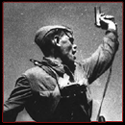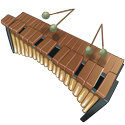|
Cast_No_Shadow posted:Most of the popular classical pieces are popular because they were easy enough for your average joe to be able to play them in their front room (as well as being good). Just by coincidence I came to ask about Fur Elise. I've been playing for about four months with no significant previous musical experience. My teacher, who is very young and has had few students, is really pushing me to learn this song. I feel it's too high above my ability level and I don't enjoy practicing it at all because I simply don't yet know notes that far off the scale, not to mention several markings that I don't even know how to name. Is mine a pretty reasonable assessment of the situation, or do people really start working on things like this so early?
|
|
|
|

|
| # ? May 20, 2024 16:25 |
|
Inab posted:Just by coincidence I came to ask about Fur Elise. I've been playing for about four months with no significant previous musical experience. My teacher, who is very young and has had few students, is really pushing me to learn this song. I feel it's too high above my ability level and I don't enjoy practicing it at all because I simply don't yet know notes that far off the scale, not to mention several markings that I don't even know how to name. Is mine a pretty reasonable assessment of the situation, or do people really start working on things like this so early? It really, really depends a lot on the student. I certainly learned it not very long after starting lessons, on the other hand I grew up with a piano playing mother so I already knew some stuff before I even had my first lesson. That said, you should always be doing at least one piece that's just a bit above your current level, otherwise you'll never move up a level!
|
|
|
|
Too soon, your teacher probably isn't very good. That piece is a Grade 7 RCM level piece. I wouldn't touch it for a while. Also, people seem to forget there are some fairly speedy parts to that piece! Sure you might be able to stumble through the arpeggios, but I sincerely doubt you can do any justice at all to the B section. Annies Boobs fucked around with this message at 18:34 on Dec 26, 2012 |
|
|
|
There are some good things about practicing things that are hard for you, but there are some big pitfalls as well which outweigh the benefits if the piece is too hard. The biggest pitfall is that with so much failure and so little success, the 'cycle of learning' is disrupted so it's hard to figure out what's working right and what isn't. By 'cycle of learning' I mean the process where you figure out something that works through trial and error or application of a method/technique/exercise, and by seeing results it reinforces that your particular method or approach is at least working somewhat. If something is very far ahead of your level of technique, you don't see enough successful results to really figure out what's what. In contrast, working on something that is above your level but still near it is challenging but also manageable. You will see success often enough, with time and effort, to make progress. Working on these kinds of pieces is more productive, efficient, and a lot less frustrating. Another pitfall of working on things that are too hard is you can barely get the notes, never mind the music, which is frustrating for a musician of course! This is unavoidable to some extent though if you are developing your technique. On all of the pieces I studied this semester, I never got any of them near to as musical as I wanted them, because it was always just barely getting the notes and then done, on to the next one. Make sure to revisit pieces you've learned when your technique has improved and work on playing them very musically! (of course, I say this but I still pull out ludicrously hard stuff from time to time to mess around with)
|
|
|
|
Cast_No_Shadow posted:Most of the popular classical pieces are popular because they were easy enough for your average joe to be able to play them in their front room (as well as being good). What are some Chopin Prelude suggestions for harder ones to move up to if I've finished: -D Flat -C Minor -A Major -E Minor ?
|
|
|
|
Elephunk posted:What are some Chopin Prelude suggestions for harder ones to move up to if I've finished: I remember learning a lot from the G minor prelude. Might be a little tricky depending on how much octave work you've done. The B minor might not be the most technically demanding piece, but it's a good addition to any repertoire. Some of the stuff in the Preludes is harder than some of the Waltzes and Mazurkas, have you looked into either of those yet? Also agreeing with Cow about the downsides of pieces too hard for you. To play Devil's Advocate, though, sometimes you can make really big gains by tackling a piece that might be beyond your abilities. In that case, however, you have to know when to stop. Years ago, I heard the Maple Leaf Rag and really, really wanted to play it. I put in a huge amount of hours, and my ability improved by leaps and bounds. Still, I had to eventually admit I just couldn't handle the Db Major section no matter how hard I tried; it wasn't until maybe two years later I finally came back and finished it up. So, you can still learn a lot from a piece that's too hard for you. Just don't kill yourself on it. ps Cow how was the jury?
|
|
|
|
If you're wanting some Chopin play his easy nocturnes!!!
|
|
|
|
Generally all his preludes are pretty nice, he wrote that set of them in every key so pick and choose or move onto his Nocturnes? E flat is the one you and everyone else knows. I like the F Minor and E minor as well. Waltz wise, E Flat again (I like that key can you tell?) and D flat are not miles away difficulty wise from the other stuff. Then again, I've never really used the traditional method of difficulty classification. A piece is either easy, a challenge or way beyond me and the best way to find out is to spend a couple of hours finding out. You'll be (or at least I am) constantly surprised at what you can actually do, and again at what you find hair pullingly difficult.
|
|
|
|
Annies Boobs posted:If you're wanting some Chopin play his easy nocturnes!!! Which are the easy nocturnes? I also have access to the Polonaises. 
|
|
|
|
Elephunk posted:Which are the easy nocturnes? I also have access to the Polonaises. Well I don't know how novice you're talking about here but his easiest that I enjoy. Nocturne in c#- no. 20 op. posth (grade 7-8) Nocturne in Eb+ op. 9 no. 2 (grade 8-9) Nocturne in e- op. 72 (grade 8-9)
|
|
|
|
Blog Free or Die posted:ps Cow how was the jury? Went better than I expected - I managed to not make any mistakes until the very end when I realized I was about to play without mistakes then psyched myself out and paused and repeated some notes, lol. I played both the prelude and fugue super slow, and got high marks from the jurors. The most important thing though is that my applied music teacher was happy with it. I wasn't fully satisfied of course - I want to really make it musical, but as mentioned before, I am just barely getting the notes. I have to be satisfied with the progress though, at least. Now it's on to Mozart's Rondo in D, another piece that is stretching me to the limit. My plan is to practice 3-4 hours a day during the break and so far I've followed that plan, except on around Christmas time. I also had a random musical inquiry to anyone in here about 'perfect pitch.' The popular belief is that it's not possible to learn perfect pitch, and that instead it's some innate ability few people possess. Well, I challenged myself to give it a go, and my own experience seems to contradict this assumption. With practice I've been able to recognize more and more pitches, and I'm pretty close to all of them. The hardest ones are the first four sharps (C#/D#/F#/G#) because there is far less music written in these keys for all of their accidentals. My method has been to use musical pieces as incipits - the first pitch I learned was A, from Shostakovich's Prelude and Fugue in A Major which is so distinctive and clear for me that it's easy to remember. Because of my jury piece as well as a choral piece we practiced intensely in Chorale, I know B-flat very well. At first, you have to go back to the piece over and over in your memory to remember the pitch, but I find that with practice doing it over and over, I just sort of go directly to it and don't need to think of the piece. Also, with some pitches it's become quick enough that I can identify them in music I hear. I got the idea of incipits from music theory where the teacher recommends using them to learn intervals (aka, a 'Here comes the bride' is a perfect 4th). CowOnCrack fucked around with this message at 22:40 on Dec 27, 2012 |
|
|
|
What specifically are you able to do? Can you identify that pitch immediately when it is played, or can you vocalize it on request, or maybe both? After a few years of playing instruments I noticed a similar thing going on. I have "perfect pitch" if the instrument that is playing is one that I'm deeply familiar with - so flute and French horn, not so much piano for me. I've heard people say this is just very strong relative pitch skills (they would probably tell you the same for what you're experiencing too, especially since it sounds like your ability isn't immediate). This caused me to browse the Wikipedia entry on perfect pitch, which is very interesting, so thanks! http://en.wikipedia.org/wiki/Absolute_pitch
|
|
|
|
Hawkgirl posted:What specifically are you able to do? Can you identify that pitch immediately when it is played, or can you vocalize it on request, or maybe both? Right now, some pitches I can identify when they are played, depending on how strong that pitch is for me. For the strongest ones it's pretty much instantaneous, for weaker ones it takes me time to think and I am prone to getting stuck. Of course having them in music vs played on an instrument makes things a lot more difficult, although I'm getting better at it. If a piece of music ever rests on one of my strong pitches I can pick it out quickly, but otherwise it can be quite hard. I probably have an "x/10" strength for every pitch. I can pretty much always identify A, Bb, D, and G, while I'm pretty good at C, E, and F. The problematic ones are those four sharps. I am useless at identifying C# and D#/Eb right now, although I'm getting a bit better at F#/G# because of some music I'm working on. Vocalizing pitches is the easiest, because no matter how slow you are, you can just use your go to pieces and then use relative skills to go where you can't go that way. I can always successfully vocalize the pitches I've learned, and I can quickly use 'relative' skills to go to the rest (i.e., go up and down half-steps.) One thing I've noticed though is that it seems like these skills could get weaker over time without constant rehearsal. I think this would be especially true for those four sharps if I ever learn them - I think this has to do with how little music is in those keys so my 'hearing' of them internally is not as strong as keys that are always used. I should note that what prompted me to try it out was that I noticed that I can recall pitches very well. In other words, when music is playing in my head, it's in the right key pretty much all the time. Very occasionally it isn't, but with a bit of time to think and work it out I can get back to the key it's in (sometimes I might think +/- 1 semitone, maybe if I'm hearing a lot of music in a key that is one semitone higher or lower). So recognizing this, I realized the problem is I have no association between pitch and letter names - probably because as I kid, I never learned to read music, I just messed around on the piano a lot - I never built those associations. So I figured that if I could use devices to associate the pitches with letter names, then I could get pretty close to what people call "absolute pitch". And what better memory device then a very distinctive piece, especially one you know very well having worked on? I don't know if I expect it to end up being flawless, though. There's a girl in my chorale class for example who is the classic example of AP - she seems to have it 'built-in', her recognition skills are near-instantaneous and she has no problem with those tricky sharps (those keys are actually her 'favorite'). I think for me there would always be a bit of latency for those keys, and I'd probably need mental rehearsal going often enough to keep them solid. In the end it does seem like RP skills, because of the use of the memory device (a distinctive piece) to create that bridge. However it seems that for some pitches the 'bridge' really isn't there anymore - I just go straight to the pitch. It's interesting to decide whether it's relative or AP skills because for these pitches - I'm now just as fast as the girl in chorale and they seem strong enough that I'm unlikely to lose it. This just comes with rehearsing that 'bridge' often enough in your head that it isn't necessary, so maybe I could work this out for all pitches, who knows? But probably, I can't expect to be as flawless as someone with early developed AP (who learned note names early).
|
|
|
|
Annies Boobs posted:Well I don't know how novice you're talking about here but his easiest that I enjoy. I'm going to take a guess you're not using the British ABRSM grading system here, guessing American? Can someone give a quick run down of how their grading system breaks down? A google search reveals little.
|
|
|
|
It has grades 1-10 with 1 being the absolute beginner and 10 being the quite proficient range. And then after that is ARCT which is any piece that's outside of the 1-10's difficulty and what you have to complete if you want to be certified as a teacher etc.
|
|
|
|
I've been wanting to learn to play the piano for a long time, and now I can afford to buy one. I was thinking about getting an affordable digital piano, something like a Korg SP-250 or similar. I'd really like a keyboard that let's me get piano sounds, and also Rhodes, organ, etc. But now I friend of mine wants to sell a Clavia Nord Electro 3 73 (he's getting a Nord Stage) for a little more than what a new SP-250 would cost. 1) Is an Electro 3 a bad keyboard if I want to learn how to play the piano? 2) Would it be a massive overkill to buy an Electro 3? It wasn't in my initial plans at all, but I got mighty curious since he's willing to sell it to me for just a little less than a entry-level digital piano would cost.
|
|
|
|
Xabi posted:I've been wanting to learn to play the piano for a long time, and now I can afford to buy one. I was thinking about getting an affordable digital piano, something like a Korg SP-250 or similar. I'd really like a keyboard that let's me get piano sounds, and also Rhodes, organ, etc. But now I friend of mine wants to sell a Clavia Nord Electro 3 73 (he's getting a Nord Stage) for a little more than what a new SP-250 would cost. Your friend is out of his loving mind and you should buy it before he sobers up. If it turns out not to suit your needs, you can probably turn around and sell it for twice what you paid, so what's the risk? Just make sure everything's working properly, because repairs can be expensive. Failing that, for what you say you want the Korg Stage Vintage piano is also very nice. Not as flexible as the Electro in some ways, but new it's $1000 cheaper. I bought mine off Craigslist for $950 and love it like crazy. Sounds like sex incarnate, and the weighting is my favorite I have ever played. https://www.youtube.com/watch?v=H_BPiScinrk Trig Discipline fucked around with this message at 22:04 on Dec 30, 2012 |
|
|
|
He might be a little crazy and he's got more money than sense. Also, he sees it as some sort of friend favour and I guess he doesn't want to deal with the hazzle of selling it and perhaps having to ship it somewhere. The keys aren't weighted though, and like I said it's only got 73 keys. Is that a problem for a person who wants to learn how to play the piano? Or should I just jump in head first?
|
|
|
|
I much prefer weighted keyboards, but I have no particular opinion on whether or not it's a Good Idea for a beginner to go weighted vs. unweighted. I know that unweighted keyboards tend to be much lighter and more portable, so consider whether or not that's an issue for you.
|
|
|
|
Trig Discipline posted:Your friend is out of his loving mind and you should buy it before he sobers up. If it turns out not to suit your needs, you can probably turn around and sell it for twice what you paid, so what's the risk? Just make sure everything's working properly, because repairs can be expensive.
|
|
|
|
Do you guys have any recommendations for PC software that plays random notes/sequences/chords for you to match for the purpose of learning to play by ear? I looked around, but almost all of them were "LEARN TO PLAY PIANO BY EAR LIKE A PROFESSIONAL MASTER IN SIX WEEKS" dvd packages and as you can probably guess that's not what I had in mind. I've been picking up songs this way for awhile but I want to be better at it and something like this would be helpful.
|
|
|
|
You could probably get some of the ear training exercises on http://www.musictheory.net/ to serve your purpose. Since they're for straight ear training (not playing it back) they aren't perfect but they are free.
|
|
|
|
Best way I've found to get started with ear training is interval memorization with standard songs. Once you know 'Greensleeves' and 'The Saints go Marching In' are a minor and major third respectively, it's super easy to internalize them.
|
|
|
|
After hours and hours and hours of practising I can finally play The Medallion Calls and He's A Pirate from Pirates of the Carribbean! Here they are, I wouldn't mind some criticism. There are some notes that I kind of half-skip when playing fast that I have to make sure to play but otherwise I think it sounds good. Man, you get pumped when you're playing He's A Pirate! 
|
|
|
|
Blog Free or Die posted:Best way I've found to get started with ear training is interval memorization with standard songs. Once you know 'Greensleeves' and 'The Saints go Marching In' are a minor and major third respectively, it's super easy to internalize them. Here are the incipits I use for intervals: Minor Second - Jaws Theme Major Second - Happy Birthday Minor Third - Greensleeves Major Third - Oh When The Saints Perfect Fourth - Here Comes the Bride / Auld Lang Syne Tritone - Simpson's Theme Perfect Fifth - Twinkle Twinkle (or Star Wars Theme) Minor Sixth - The Entertainer (entry after pickup) Major Sixth - My Bonnie Lies Over the Ocean Minor 7th - Star Trek Theme (also, knowing dominant chords makes this easy) Major 7th - Same thing as an Octave -1, or a minor second down then up one octave. I.e., tonic + leading tone Octave - Somewhere Over the Rainbow but easy because it's the same pitch repeated For pitches: A: Prelude and Fugue in A, Shostakovich Bb: Prelude in B-Flat, WTC 1, J.S. Bach B: I have my own random unheard of chorale piece composed by someone in class, but see WTC and other books like it C: Prelude in C, WTC 1 C#: Prelude and Fugue in C# Minor from WTC 1 is probably fine, also Chopin's Fantasia Impromptu goes 5 to 1 in the opening D: Invention No. 4 in D Minor, Rachmaninoff Concerto No. 3 Eb: Prelude in Eb WTC 1 probably great F: Invention No. 8 in F F#: random chorale piece G: Prelude in G, WTC 2 Ab/G#: Concerto for Solo Piano, Alkan (I listened to this a poo poo ton and like the opening theme) If your are interested in getting better at recognizing keys, works like the Well-Tempered Clavier and similar works by Chopin, Shostakovich, William Gillock, etc., are excellent, because they have pieces in every key, both major and minor, and you can probably find one that begins strongly on the tonic with a distinctive theme. Without a good theme to assist in memorizing, learning pitches is very difficult and still requires lots of rehearsal. I still find it helpful to know them though - if you are thinking of some music in your head you can have a good idea where to start composing. For triads: Major: Easy to tell Minor: Also pretty easy to tell Diminished: Listen for the minor third, because the structure is m3^m3 Augmented: Listen for the major third, because the structure is M3^M3 For inversions: 1st Inversion: Listen for P4 on the top 2nd Inversion: Listen for P4 on bottom Here are some web resources: http://www.hansenb.pdx.edu/pdf/AuralSkill.pdf https://www.teoria.com/index.html https://www.musictheory.net https://www.good-ear.com https://www.earpower.com https://www.miles.be https://www.sonicfit.com More: http://musicmoz.org/computers/software/educational/theory_and_ear_training https://www.newfreedownloads.com/find/ear-training.html
|
|
|
|
quote:Major Sixth - My Bonnie Lies Over the Ocean You can also use the Xylophone NBC jingle for this one! ("En, Bee, Cee!")
|
|
|
|
CowOnCrack posted:Here are the incipits I use for intervals: This is amazing and I wish it could be added to the OP. Thanks a ton!
|
|
|
|
CowOnCrack posted:Here are the incipits I use for intervals: Thanks for this! I started using Tenuto to practice ear training and stumbled on to using memorable songs to spot intervals. Minor/major 6th and minor/major 7th were tricky since I didn't have go-to songs for them (until now!). Now to my question: I have a great piano I really enjoy, but I want something I can use conveniently for practice. Specifically, for ear training practice when I want to play some notes or chords while reading through textbooks. Does anyone have suggestions for a very compact desktop-use keyboard that would be good for this? It would only need maybe an octave or two since I just need to play the note and figure out fingerings of chords. Something along the lines of those mini MIDI keyboards meant for portable laptop usage, but that preferably uses batteries so it's self contained and doesn't need a laptop to work. IkeTurner fucked around with this message at 02:01 on Jan 9, 2013 |
|
|
|
Jazz Marimba posted:This is amazing and I wish it could be added to the OP. Thanks a ton! Yeah it might be time for me to make a new OP with all this information we've written added into it. It's really bare.
|
|
|
|
Annies Boobs posted:Yeah it might be time for me to make a new OP with all this information we've written added into it. It's really bare. I support this. Especially because the title of this thread is really, really boring.
|
|
|
|
IkeTurner posted:Minor/major 6th and minor/major 7th were tricky since I didn't have go-to songs for them (until now!). Distinguishing between Tritone, Major/Minor 6th, and Major/Minor 7th are very hard (even with a P5 thrown in) because they are a lot less common than the other ones. It took me a long time to get those and I'm still not quite there. Minor 6th is probably the hardest - sometimes it even sounds consonant for me. It will take probably weeks to months of practicing a bit every day to get those ones down. IkeTurner posted:Does anyone have suggestions for a very compact desktop-use keyboard that would be good for this? It would only need maybe an octave or two since I just need to play the note and figure out fingerings of chords. Something along the lines of those mini MIDI keyboards meant for portable laptop usage, but that preferably uses batteries so it's self contained and doesn't need a laptop to work. There are fold-up keyboards that are a cheap solution, like these: http://www.amazon.com/Silicone-port...=keyboard+piano Then you've got this super discounted thing, etc.: http://www.amazon.com/37-Keys-Elect...words=keyboards http://www.amazon.com/First-Act-FI1...words=keyboards If it's just for theory and basic learning purposes, I would invest only a small amount of money.
|
|
|
|
CowOnCrack posted:Minor 6th is probably the hardest - sometimes it even sounds consonant for me. I had problems with that too, 'til I realized it's the opening to the Chopin waltz in C# minor 
|
|
|
|
Minor 6th is the easiest for me! Theme to Love Story!
|
|
|
|
This is my first post in this thread so hi everyone. One day I decided to try out music production after not having any prior musical experience. This led to me studying music theory, and eventually buying a midi controller. I had a chance at mucking around on my girlfriend's piano just improvising chords with my left hand and a rambling melody in my right hand and I really, really enjoyed it and was inspired to actually learn to play. Fast forward a few months and I just bought myself a Korg Kronos, the 88-key "piano-action" version, as I would like something good to learn piano on and to also produce music with. It has a great feel, and the piano samples on it sound really good. I haven't really bothered with exercises or learning songs though, I usually just pick a scale and improvise using the chords and notes within that scale, though I do sometimes practice scales. I feel as though I have been improving but after reading some of this thread am thinking it's a good idea to start actually using some exercises and learning some songs. I haven't yet read the whole thread so please excuse me if what I am asking has been covered previously, but are there any "definitive" piano exercises or things to do/learn that every person serious about learning to play should know/practice? Things that I have identified that I need to work on are making my fingering consistent and also working on changing chords fluidly, especially chords containing black keys, as well as playing chord variations. I really love rich sounding open chords. The sort of music I would like to play ideally is Jazz, I don't have much interest in classical piano or contemporary pop songs, but I can see how learning some pieces would be helpful.
|
|
|
|
CowOnCrack posted:Distinguishing between Tritone, Major/Minor 6th, and Major/Minor 7th are very hard That's good to hear. I've been struggling with those and thought I might just be bad at hearing tones. CowOnCrack posted:(Keyboards) Thanks! I'll check these out. Also, I highly recommend Tenuto. I've been using it for a while now for ear training and I've made quite a bit of progress. We should add the link to the OP. (And links to any similar apps for platforms besides iOS)
|
|
|
|
CharlesDexterWard: (As an aside, I read that tale only a couple of days ago) My practise regime is something like. 15 mins-20 mins run around the scales, 4 octaves up and down, then mess about for a while, up, contrary out, up, down, contrary in, contrary out, down etc. For each scale, throw in some a 6th or 3rd apart. 15 minutes or so working on some technical skill, for your need for example I'd pick a chord start at the lowest end of the keyboard and play all its inversions working up the keyboard varying it with rhythm, legato, staccato, various volumes and pedalling. Sight read some things plucked at random from a huge stack of sheet music I've printed off for this purpose. Work on pieces for an hour or so. Run through another technical skill and go round some scales messing with rhythms and such. Takes somewhere around 2 hours as that fits with my life and chunks of time I happen to have free. You could easily adapt this to your own needs, I found having a structure like this means I don't skip out on boring things in favour of fun things. The first 30 mins could be exactly the same as mine. Instead of sight reading maybe play through various jazz standards? For Work on pieces sub in whatever the main thing you do is, improv etc Then finish up with some more technical work. It's pretty simple and should see you a long way.
|
|
|
|
Cast_No_Shadow posted:CharlesDexterWard: Thanks for all of your advice. I have read many people say that practice is up to an individual but I always like a starting point, which I could change up if need be. I really need to work on my sheet reading skills, it's something I have neglected as I haven't yet needed to read sheet music. I found a chord exercise to try which involves playing chords and going up half steps for an octave or more and then going back down. So you play C-E-G then after that move to C#-F-G# then move to D-F#-A etc. I will mix that in with practicing chord inversions, as well as my fingering for chords. I play 7th chords a lot in my left hand and the way I finger that is 5-4-2-1 as I saw it in a YouTube video and it seems comfortable to me. I also play my regular triads with a 5-4-2 fingering, but I haven't read anyone recommend that fingering for the triads, but I find the one I read most often (5-3-1) to be somewhat uncomfortable. Should I stick with what I have or should I try and get used to the 5-3-1? (It is one of my favourites, I need to re-read it at some stage). CharlesDexterWard fucked around with this message at 20:35 on Jan 11, 2013 |
|
|
|
CharlesDexterWard posted:I play 7th chords a lot in my left hand and the way I finger that is 5-4-2-1 as I saw it in a YouTube video and it seems comfortable to me. I also play my regular triads with a 5-4-2 fingering, but I haven't read anyone recommend that fingering for the triads, but I find the one I read most often (5-3-1) to be somewhat uncomfortable. Should I stick with what I have or should I try and get used to the 5-3-1? The 5-3-1 is most common because it fits most hands most easily and is really easy to know you're in the right shape. Personally I see no reason why you couldn't use any fingering that works as long as you don't gimp yourself for the next chord\notes. Consistency (and not giving yourself carpal tunnel) is more important for something like that than 'you have to use fingers X-y-z'. Pick one, stick to it with exceptions when the piece demands it.
|
|
|
|
Not really sure if this is the right thread, but I couldn't find a better one. I ended up buying my friend's Nord Electro (I posted about this a couple of weeks ago). I got it last week and have been playing a lot, or, rather, trying to play, I don't really know how to play the piano yet. I've been using my headphones though, and in the future I'd like to use it through an amp. But I have no idea what kind of amp I need. I saw a guy on Youtube use a Behringer K3000 which seems like a decent amp, but I'm not if it fits my needs. It seems kind of big and I'm only going to use it at home. Do you have any suggestions? How much money should I use? Also, what the easiest and best way to record my Nord? I've got a Focusrite Scarlett 2i2 but the Nord has to outputs, one left and one right. I assume it's possible to plug it into the audio interface somehow? Xabi fucked around with this message at 15:16 on Jan 14, 2013 |
|
|
|

|
| # ? May 20, 2024 16:25 |
|
Xabi posted:Not really sure if this is the right thread, but I couldn't find a better one. Not an area of expertise for my self but the extend of my knowledge is basically, if you are playing to yourself\in your bed room etc just buy any half decent monitors and be happy.
|
|
|
























